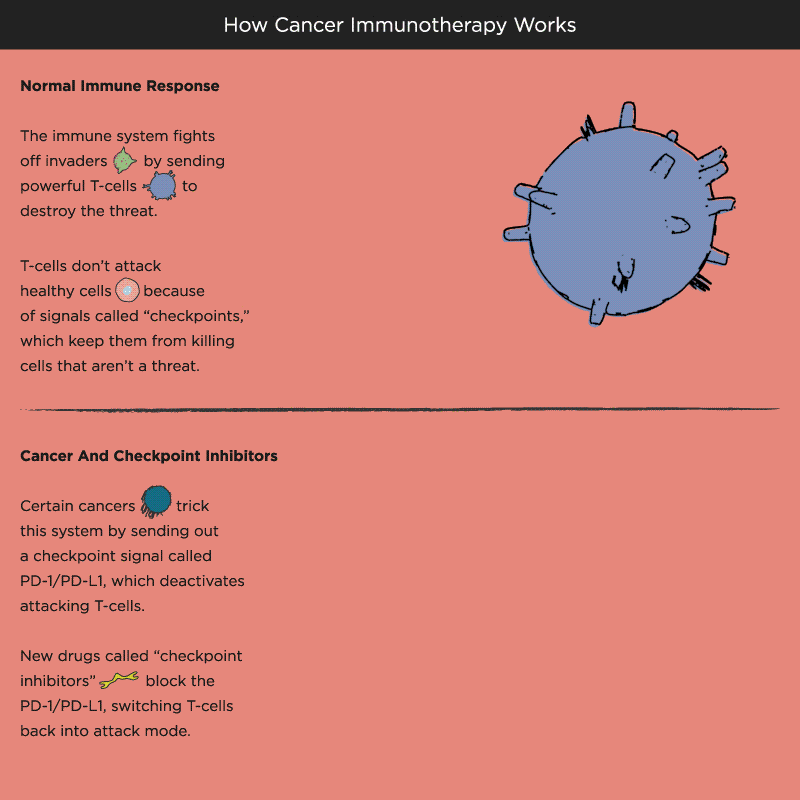Johns Hopkins will launch an institute devoted to the study of a new and promising approach to cancer treatment, embracing the Obama administration's "moonshot" initiative to cure cancer, an effort led by Vice President Joe Biden.
The Bloomberg–Kimmel Institute for Cancer Immunotherapy was founded with two $50 million gifts—one from Michael R. Bloomberg, philanthropist, entrepreneur, and three-term mayor of New York City; the other from philanthropist Sidney Kimmel, founder of Jones Apparel Group. An additional $25 million for the center was contributed by more than a dozen additional supporters.
Biden, Bloomberg, and the supporters of this initiative will announce the center's launch today at 12:30 p.m. at the Johns Hopkins medical campus in East Baltimore. The announcement will be broadcast live online on the JHU Ustream channel.
Immunotherapy has the potential to cure and end all forms of cancer, researchers say, making it the most rapidly advancing approach to cancer treatment and one of the most promising avenues of cancer research today. Immunotherapy seeks to redirect patients' highly individual immune systems to target, detect, and destroy cancer cells.
"We are at the forefront of an emerging and promising field of cancer research and treatment," said Paul Rothman, dean and CEO of Johns Hopkins Medicine. "We are grateful for these tremendous gifts, which will help us accelerate the already rapid pace of discoveries in immunotherapy."
The institute will further strengthen Johns Hopkins' world-class program in cancer immunology, uniting the Johns Hopkins Kimmel Cancer Center experts with the immunology, genetics, microbiology, and biomedical engineering experts throughout Johns Hopkins in a concentrated effort involving more than 100 scientists and clinicians.
Also see
"Michael Bloomberg and Sidney Kimmel are visionaries," JHU President Ronald J. Daniels said. "Their philanthropy has already fostered remarkable innovation throughout Johns Hopkins, transforming the landscape of public health and cancer research. The new Bloomberg–Kimmel Institute builds on that legacy, giving us the latitude to dream big as we accelerate our efforts to end all forms of cancer."
How funds will be used
Although funding for the new institute will primarily support research, it will also be used to recruit additional scientists; provide additional infrastructure for engineering cellular products related to immunotherapy research; enhance partnerships with the private sector, including biotech and pharma; and invest in critical technology development, such as new ways to profile the immune response inside the tumor. Research at the institute will focus particularly on melanoma, colon, pancreatic, urologic, lung, breast, and ovarian cancers.
"We believe the focused and collaborative research made possible through the Bloomberg–Kimmel Institute for Cancer Immunotherapy will advance immunotherapies to the point where the immune system will ultimately be able to beat 100 percent of cancers," said Drew Pardoll, the institute's inaugural director. "The potential to control or cure even the most advanced, treatment-resistant cancers has been elusive until now."
Pardoll is an internationally recognized scientist whose career in immunology and cancer research spans 25 years. He is best known for discoveries related to three types of white blood cells—two kinds of T cells, the foreign substance-fighting soldiers of the immune system; and a type of dendritic cell, which acts as a messenger service for the immune system.
Charles Drake, Elizabeth Jaffee, Jonathan Powell, and Suzanne Topalian will serve as institute co-directors.
Bloomberg and Kimmel: A history of support
Kimmel and Bloomberg each have a long history of support for Johns Hopkins, and particularly for the health sciences.
Bloomberg, a 1964 graduate of Johns Hopkins University and chairman of its board of trustees from 1996 to 2002, has given more than $1.2 billion to the university and the Johns Hopkins Health System since graduating. Funding from Bloomberg has contributed to a physics building, a school of public health, a children's hospital, a stem cell research institute, a malaria institute, and a library wing.
Bloomberg has also financed 20 percent of all need-based financial aid grants to undergraduates, with more than 2,000 scholarships committed over the next several years. In January 2013, he committed an additional $350 million to recruit 50 faculty members as Bloomberg Distinguished Professors and support undergraduate financial aid. The majority of this gift is dedicated to creating 50 new interdisciplinary professorships, galvanizing people, resources, research, and educational opportunities to address major world problems.
"Ending all cancer would rank among humanity's greatest achievements, and immunotherapy is bringing that dream within reach," Bloomberg says. "This new institute will build on the pioneering work that doctors and researchers at Johns Hopkins have done in immunotherapy and help fuel new advances and discoveries. It's an honor to join Vice President Biden in the moonshot effort he's leading to end cancer and also to partner with Sidney Kimmel, whose generous and committed support for cancer research is saving lives."
Since 2001, Kimmel has contributed $157 million; in recognition of that generosity, Johns Hopkins named its cancer center after him. Kimmel also has given an additional $2.4 million to support 12 young cancer scientists at Johns Hopkins as part of his national Kimmel Scholars Program.
The Sidney Kimmel Comprehensive Cancer Center at Johns Hopkins, based in Baltimore, is one of 45 centers designated by the National Cancer Institute as a comprehensive center.
"I could not be more honored to partner with Mike Bloomberg and capture the opportunity to advance immunotherapy research at this critical moment," Kimmel says. "Having been committed to cancer research for more than 20 years, it simply thrills me to know that the scientists at the Johns Hopkins Kimmel Cancer Center see a new light at the end of the tunnel."

Image credit: Jacob O'Neal for NPR







